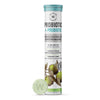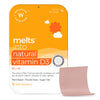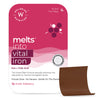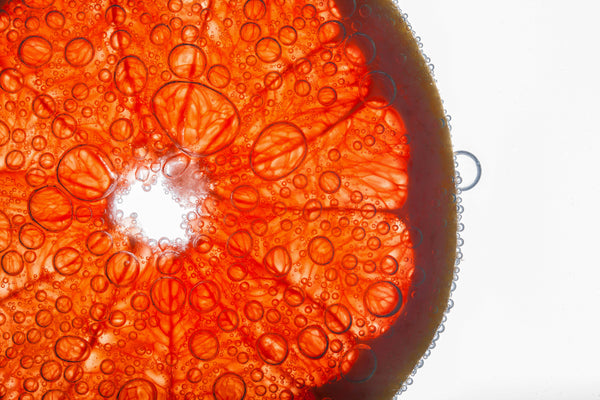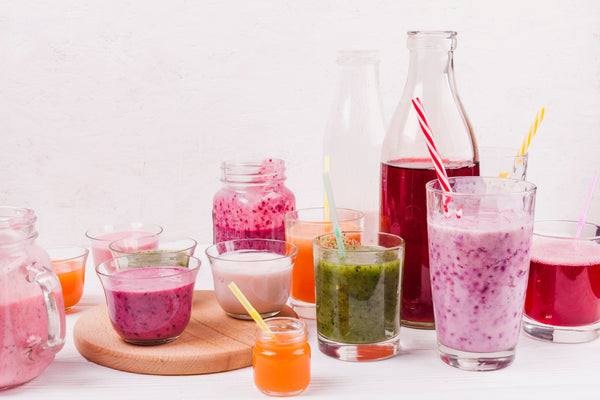These days, every other food label reads "Gluten Free". Gluten is part of your bread that makes the flour rise while baking and gives elasticity to the dough that is stretched while making pizza. So why are manufacturers and even supplement brands opting to go gluten-free?
The word "gluten" is Latin for glue and is frequently found in bakery goods and a few grains. Foods containing gluten have a chewy feel and form. Few individuals, though, are unable to digest this protein, which causes stomach problems. Such people have no option but to go for gluten-free food sources. Realizing this demand, gluten-free food products are being developed and sold extensively in markets. There are, however, a lot of misconceptions and myths surrounding gluten, making people follow the gluten-free trend without knowing its actual purpose. In this article, we’ve listed down everything you need to know about the "gluten-free" concept and why certain people, food companies, and nutraceutical manufacturers are choosing to go the "gluten-free" way.
What is Gluten?
Wheat, rye, barley, and triticale (a hybrid between wheat and rye) all contain gluten, an insoluble protein that is sticky and gooey. If oats are processed alongside other foods that contain gluten, they may occasionally include traces of this protein. Gliadin and glutenin are the two primary proteins that make up gluten. The majority of people are unaware that gluten is not a component of flour but instead is created when water is introduced. In wet dough, gliadin, glutenin, and water combine to form gluten, a structure that resembles a mesh.
Role of Gluten in our Diet
Food items like bread, pasta, pizza, and cereals all contain gluten. It holds food together by acting as a binder. By encasing gas and retaining moisture, gluten creates an elastic web that aids in bread rising. It gives the bread a spongy texture and makes the dough stretchier and chewier. For instance, the absence of gluten could make bread and pizza dough collapse. Gluten is a protein that naturally occurs in food, but it can also be concentrated, extracted, and added to some food products to boost protein content and improve flavor and texture.
Difference Between Celiac Disease, Gluten Intolerance, and Sensitivity
1. Celiac disease:
Also known as gluten-sensitive enteropathy, celiac disease is an autoimmune disease that affects the lining of the small intestine. The internal lining of the intestines is covered with villi (small hair-like projections) that absorb nutrients and act as a security barrier from invaders. Ingestion of gluten triggers a reaction by the immune system in which the body attacks its own tissues (villi) in the small intestines. The immune system mistakes gluten for a foreign body, which triggers such a response. This leads to malnutrition as the villi are no longer able to absorb nutrients from food. Symptoms of celiac disease include anemia, stomachache, gas, bloating, diarrhea, constipation, delayed growth, skin rashes, osteoporosis, weight loss, infertility, and depression. Certain blood tests, genetic testing, and biopsy can help in the detection of celiac disease.
2. Gluten Intolerance or NCGS (Non-celiac Gluten Sensitivity):
Even though they don't have celiac disease, some people have comparable symptoms after eating anything that contains gluten. The words NCGS and glucose intolerance are interchangeable. Gluten sensitivity refers to symptoms that are less severe, but gluten intolerance refers to symptoms that are more severe and last longer. In NCGS as well, the body perceives gluten as an invader, and immediately after ingesting it, inflammation occurs both inside and outside the digestive system. When the body releases white blood cells to defend itself against different bacteria or viruses, inflammation results. Fatigue, a skin rash, joint pain, mental fog, etc. are signs of non-celiac gluten sensitivity. When gluten is removed from the diet, these symptoms go away.
There is no specific test to diagnose gluten intolerance or sensitivity, but if you have tested negative for celiac disease and still experience similar symptoms of gastric pain, bloating, etc., you could be having nonceliac gluten sensitivity.
3. Wheat Allergy:
Some people do not have gluten sensitivity or celiac disease but have wheat allergies and develop symptoms after eating wheat-based products. A wheat allergy happens when the immune system produces antibodies against proteins found in wheat. There are four classes of wheat proteins: albumin, gliadin, globulin, and gluten. The symptoms of wheat allergy can vary from mild ones like runny nose, hives, and watery eyes to severe ones like swollen tongue, racing heart, and shortness of breath. The severe symptoms can occur due to anaphylaxis (a life-threatening allergic reaction).
How Does Gluten Affect Overall Health and Wellbeing?
While gluten has a few benefits, many are opting to exclude it from their daily diet. Gluten can cause some serious side effects in people who are sensitive or intolerant to it.
1. Gastric Disorders
Some people can have a hard time digesting this protein, leading to gastric disorders such as celiac disease and gluten intolerance, or gluten sensitivity. Celiac disease and gluten sensitivity are autoimmune diseases (allergic reactions triggered by the immune system). While celiac disease can cause severe damage, gluten sensitivity is comparatively less severe and is capable of causing only gastric discomfort.
2. Inflammation
Inflammation is the body’s natural response to irritants; a mechanism to protect and heal the body. For example, when you have an accidental cut or injury in your body, the quick healing process that takes place is an inflammatory response. This inflammation also happens when there is an infection in the body due to pathogens like viruses and bacteria. Inflammation that remains in the body for a short time is called acute inflammation, while long-standing inflammation is termed chronic inflammation. Certain foods, like refined starches, saturated fats, etc., cause inflammation. Although gluten may not trigger inflammation in everyone, certain people who have a sensitive gut may face inflammation triggered by the ingestion of gluten. The immune system of such people misconceives gluten as a pathogen, which causes them to create this inflammation. Chronic inflammation of the body can lead to an increased risk of conditions such as cardiovascular (heart) disease, diabetes, dementia, depression, and even cancer.
3. Autoimmune disorders
Imagine you get a pet dog for yourself who is pretty alert and protects your house from invaders in your absence. Now one day, suddenly, your dog stops recognizing you and attacks you every time you try to make an entry into your house. Autoimmune disorders have the same basis. Our immune system is designed to protect our body from external invaders like pathogens, but at times it mistakes harmless entities like gluten in foods for pathogens. Thus triggering an autoimmune response that tends to damage the healthy cells in our body in the bargain of fighting the so-called "invaders". Such autoimmune responses against gluten lead to gastric disorders such as celiac disease and gluten intolerance.
4. Malnutrition
Celiac disease, or gluten-sensitive enteropathy, triggers an immune response in the small intestines that tends to destroy their internal lining. This internal lining of the small intestines has villi (tiny hair-like projections) present on them, which aid in the absorption of nutrients from food. Damage to these villi causes malabsorption of these nutrients. Malnourishment triggered by gluten can lead to weakness, fatigue, diarrhea, a weak appetite, and anemia.
It is for this reason that certain nutraceuticals have come up with gluten-free supplements such as vitamin B12, vitamin D3, and iron supplements. Opting for gluten-free supplements can help you prevent such gluten-induced malnourishment or deficiencies.
5. Brain Health
We’ve seen how gluten leads to inflammation in cells. This inflammation may affect various parts of the body including the brain. Inflammation in the cells of the brain can lead to various brain-related disorders such as mood disorders, behavioral issues, foggy brain, cognitive impairment, or memory issues.
What is a Gluten-free Diet?
A gluten-free diet excludes all types of foods that contain gluten. Just because gluten is mainly present in certain carbohydrate-rich foods (wheat, barley, rye, oats, and triticale), it doesn't mean one needs to eliminate carbohydrates on a gluten-free diet. Certain carbohydrates are naturally gluten-free, like rice, potatoes, tapioca, etc. Similarly, you may be surprised to find gluten in certain foods that are not natural sources of gluten, like some packaged foods and sauces, and gravies.
Why are People Opting for Gluten-free Diets?
People need to opt for gluten-free foods when they are unable to tolerate gluten. The reason why gluten-free is gaining popularity is because of the increase in awareness of gluten sensitivity among the masses. We now have certain blood tests, genetic testing, and even biopsies that confirm conditions like celiac disease. Moreover, gluten is also going through a lot of processing compared to the ones present in whole foods. This is further making gluten less tolerable for people with allergies or sensitivity.
If you too are intolerant to it, removing meals high in gluten becomes essential, as it may cause severe allergic reactions. Symptoms of certain conditions of the gut, like Irritable Bowel Syndrome, Leaky Gut, Chrohn’s Disease, etc., may overlap with those of gluten-related disorders, but their root causes and methods of treatment vary. Hence, it is advisable to make a visit to your doctor and be more sure about your condition. This will empower you to make better and more informed food choices.
Gluten-free Food Alternatives You Can Try
People unable to tolerate gluten need to avoid foods such as wheat, barley, rye, bread, pasta, pizza, cereals, beer, cakes, cookies, and pastries. Oats do not naturally contain gluten, but if they are processed alongside other foods that do, they may end up with traces of the protein. Similarly, many processed foods contain gluten, such as energy bars, french fries, baked goods, noodles and pasta, croutons, flour tortillas, brewer’s yeast, beer, etc.
If you have been diagnosed with any of the gluten-related disorders listed above, you do not need to lose hope. There are ample gluten-free alternatives that you can try.
Grains such as buckwheat, rice, arrowroot, millet, tapioca, sorghum, buckwheat, and other foods such as meat, sea fish, dairy products, fruits, vegetables, legumes, nuts, seeds, oils, butter, etc. are naturally gluten-free foods.
While you go through the food label, beware that gluten may be hidden in certain food products under the names "modified starch" and "natural flavors".
Why Do Brands Choose to be Gluten-free?
Many people may be unaware of their gluten-related disorders and may end up developing allergies after the consumption of certain products. Being gluten-free assures customers that the food product is safe for them and their acquaintances. Imagine that you are planning to meet your school friend after a long time, and you stop by a shop to buy a gift for them. You plan to pick up a hamper of goodies with eatables, but you don't know if they are sensitive to gluten. You read "gluten-free" on the food label and are now rest assured that irrespective of their condition, your friend can safely eat them.
From packaged food items to pharmaceuticals and nutraceuticals, all are opting to be gluten-free. Gluten-free supplements are also gaining popularity among fitness enthusiasts with sensitive guts. Some of the best gluten-free protein powders and best collagen supplements on the market are also now gluten-free.
Wrapping Up
We are in a better position to manage a disorder when we are aware of it. Next time you read "gluten-free" on any packaged item, you know exactly what it means and if it is a matter of concern for you. Apart from opting for gluten-free foods, it would be a wise decision to add some prebiotic and probiotic supplements to your daily intake. Probiotics (healthy gut bacteria) and prebiotics (fiber or food for probiotics) help your gut in the overall digestion process and enhance its function.
Today’s fast-paced lifestyle makes it very difficult to meet our nutritional needs, but at the same time, it becomes all the more important to ensure a healthy, balanced diet to maintain your health and deliver your best. Since gluten can put you at risk of nutritional deficiency, supplements like a multivitamin for him or a multivitamin for her that are gluten-free can be a quick and easy way to fulfill your nutritional demands.
References
What Is Gluten and What Does It Do? | Johns Hopkins Medicine
Celiac Disease vs. Gluten Intolerance (Infographic) | Northwestern Medicine
Ditch the Gluten, Improve Your Health? - Harvard Health
Gluten | The Nutrition Source | Harvard T.H. Chan School of Public Health
What is Gluten? | Celiac Disease Foundation
nested-pcr.pdf (researchgate.net) - https://www.researchgate.net/profile/Suhad-Mustafa/publication/355735208_nested_pcr/links/617bc297eef53e51e1ff47f1/nested-pcr.pdf
Non-Celiac Gluten Sensitivity: An Update - PubMed (nih.gov)
https://www.glutenfreesociety.org/does-gluten-cause-cancer/
https://www.frontiersin.org/articles/10.3389/fimmu.2011.00098/full








